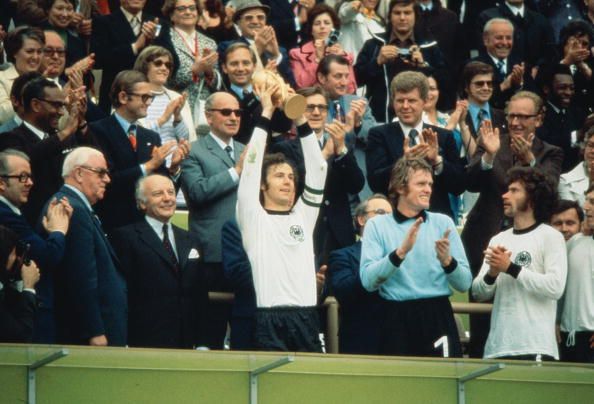
Franz Beckenbauer: All hail Der Kaiser

1970. Mexico. The Game of the Century was in motion. Germany were trailing by a single goal to Italy in the semi final of the World Cup in the jam packed Azteca Stadium. The atmosphere was electric. A Germany defender is fouled and fractures his right clavicle, but the Germans have already used up all of their substitutes. He is asked to come off. But he decides to stay on the field and play with his arm tied up in a sling.
After one of the most thrilling 120 minutes of football ever played, the Germans lost. However, one man from the Mannschaft won that day. Franz Beckenbauer.
“The strong one doesn’t win. The one that wins is strong.”
True to his own words, Franz Beckenbauer remained a winner and remained strong. That one game defines all about his character and ability with a 120 minutes worth of brevity. And even that is just a start.
Franz Anton Beckenbauer was born on this very day in a war torn Germany. His birthplace, Munich, being the industrial center of the country, had been a special target of the Allied forces during the war and had been reduced to ruins. Against his father’s wishes, he started playing football by the age of 9 and quickly started showing promise, culminating in him joining the Bayern Munich youth team at the age of 15. After spending three years in the youth ranks, Beckenbauer made his debut for the Bavarians in 1964 in the regional league as a left winger. Bayern were rampant and won promotion to the Bundesliga that season itself.
Within two years of being in the top tier, Bayern Munich transformed from minnows to giants of German football, playing controlling, tactically effective football with emerging young players such as Beckenbauer, Gerd Muller and Sepp Maier, who would go on to become global superstars in the future.
In 1967, a young Beckenbauer was handed the captaincy of the side who had just won the European Cup winner’s Cup. It was during this time that the media gave him the moniker of Der Kaiser (The King). How and why the moniker stuck is a matter of speculation but a popular anecdote refers to an incident of him standing beside the statue of Austrian King Franz Joseph as being the culprit. But nevertheless, the monicker became hugely popular in and around Europe. People started to see Beckenbauer as this grandiose figure under whose feet the ground trembles. Such was his popularity in the continent that a Monty Python Sketch featured him captaining such personalities as Immanuel Kant and Karl Marx.
Beckenbauer would lead Bayern through its greatest glory days. Under his leadership, Bayern won four league and five cup titles, including a league and cup double in 1968-69 season. They were also rampant in Europe with three successive European Championships from 1973 to 1976, making him the only captain ever to win it three times.
Beckenbauer would go on to redefine the sweeper position, turning it into a free attacking role which would trouble traditional lineups of the opposition because there would always be one player roaming free. Not only did he define the style, he excelled at the sweeper role, making it hard for opposition to score against them and being always the instigator of counter attacks. With his tackling prowess combined with nifty dribbling and beautiful technique, Beckenbauer was the complete package, solid at the back, sharp at front.
All this glory with his club wasn’t going unnoticed and he was handed over the captaincy of the West German side in 1971 after having already featured in the World Cup All Star teams of both the 1966 and the 1970 World Cups. He would later get a treble of All Star Teams in the 1974 World Cup, becoming the first player ever to do so.
The Germans were a strong side, finishing runners up and second runners up in 1966 and 1970 respectively, but really flourished only after Beckenbauer was handed the arm-band. They captured the 1972 European Championships and the 1974 World Cup in another thrilling finale against the much talked up Dutch team of Johann Cruyff. Der Kaiser bagged the Balon d’Or twice during this period, in 1972 and 1976.
After leaving Bayern in 1977, Beckenbauer joined the New York Cosmos and retired in 1982. After 18 glorious years of his playing career, he bid adieu to the playing field. However, that was not to be all.
He was quickly appointed as the national coach after retirement and guided Germany to two successive World Cup finals in 1986 and 1990. In 1990, a rematch of the previous final with Argentina, the Germans came out as victors, making Beckenbauer the first person to win the World Cup both as coach and player. After the World Cup, he left his position to manage clubs and after stints in France, settled at his home club, Bayern Munich once again, taking them to the league and European glory in 1994 and 1996 respectively. In 1998, he was made the President of the club, a position he still holds, renamed as Chairman of the board.
In 2006, he successfully led the German World Cup bid and served as the chairman of the organising committee, hosting the FIFA World Cup with great aplomb. Success had indeed become second nature to this man.
Franz Beckenbauer has been less active on the footballing scene since then but still manages to grasp the imaginations of millions of football fans around the globe. Worshiped as a player and adored as an administrator, he remains one of the few footballing personalities not to divide opinions. He was, is and will remain, the unanimously chosen King of German football, one of the greatest players ever. Der Kaiser. Hail to the king!